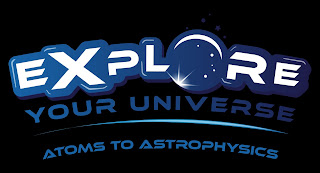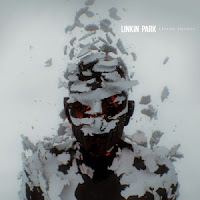[Outreach] 'Explore Your Universe' introduction
I recently signed up to be a part of the "Explore Your Universe" science outreach project. Outreach is something that I've been doing a reasonable amount of during my PhD, mostly in the form of the planetarium shows that I've been organising. But I've been considering outreach and science communication as a possible career alternative, and therefore looking for ways to broaden the outreach that I'm getting involved in.
The 'Explore Your Universe' logo. I'm really looking forward to getting
involved in this exciting project. (Credit: exploreyouruniverse.org)
"Explore Your Universe" is an interesting looking project from the UK Association of Science and Discovery Centres that is basically a way to encourage research scientists to engage with the public in a friendly setting. The idea is that scientists, like me, sign up to the scheme and are assigned to a specific centre. There will be 'meet an expert' days at which the scientists can turn up and talk to the public about their work, or about science in general. Obviously it's a captive audience, and the people visiting science centres will tend to be at least slightly interested in the first place.
I've been assigned to Dundee Science Centre. Sadly I wasn't able to make their first 'meet an expert' event, but I'm hoping to go along to the next one. However in the mean time I've pu up an introductory blog post over at the "Explore Your Universe" blog, and thought I'd cross-post it here (after the cut).
Name: David
Brown
Job title: PhD Student
Where do you work? The University of St Andrews
What field do you work in? Astronomy, specifically extrasolar planets
After taking part in an introductory session at the Dundee Science
Centre, I’m really looking forward to getting involved in this project.
Hopefully I’ll get to meet lots of you in reality at some point, but for now I
thought I’d put up an introduction to myself and my work.
Your
research
What is the big question you’re currently
working on?
The study of extrasolar planets is a fairly young field of
research within astronomy, but it’s a really exciting, fast paced one, which
means I get to do a few different things at any one time. At the moment I’m
trying to study the variety of planetary systems, and work out how they get to the
way that we see them today. How do they change over time? What were they like
in the past? What will happen to them in the future?
At the moment though the biggest question is “can I finish my
thesis on time”, but that’s only really got one possible answer!
What do you use to answer that big question?
Mostly my work is done on my desktop computer or laptop. Like many
modern astronomers I do a lot of my work through simulation and computer
modelling. After all it’s quite hard to do typical science experiments when
what you’re trying to investigate takes place over millions (if not billions)
of years; you have to wait an awfully long time to get results!
However I’m lucky enough to also get to travel to different
observatories around the world to make observations of the stars and planets
that I’m interested in. A lot of my observing is done right here in St Andrews
with the 1m diameter James Gregory Telescope, but I’ve also been to France and
Chile to use telescopes there, and I’m hoping to go to the Canary Islands in
the near future.
What do you enjoy the most about your work?
The fact that I’m investigating things that we don’t know yet is
great. It’s a real thrill to discover something, and realise that you’re the
first person to have that piece of knowledge. I also love going to conferences,
and talking to other scientists within my field. I’ve had many an idea develop
over a cup of tea and a chat. But I think my favourite bit has to be using the
telescopes to look at the stars. It’s very calming, but also makes me feel very
humble.
Is there anything you don’t like?
Sometimes the hours can build up, particularly when telescope
application deadlines roll around. Swapping between day and night shifts when I
go observing can also be hard on the body and mind, but I try to keep active
and get decent amounts of sleep to counteract it.
Your Inspiration
What inspired you to study
science/engineering/maths in the first place?
It was a few things really. The first was the sets of images from
the Hubble Space Telescope. I remember seeing them when I was fairly young, and
being amazed. What were those fascinating objects? Where were they? How could I
find out more? That got me started on reading about space and trying to learn
more about what was out there. Then I was lucky enough to have a succession of
really enthusiastic science teachers at school. In particular my Physics
teacher through my GCSEs and A-levels was a real inspiration to me, and made
the subject so much fun that I couldn’t imagine doing anything else.
What do you enjoy doing outside of your work?
Loads of things. Probably too much to be honest – I often don’t
end up with much time for just sitting down to rest!
As well as research I do a lot of outreach work at the university
observatory, and also take our inflatable planetarium roadshow around primary
schools in Fife. It’s a lot of fun, and helps to get children enthused by the
idea of space at a young age. I find that they ask much harder questions than
adults as well!
Outside of astronomy related things I’m a member of the RLSS, and
a qualified lifesaving instructor, so spend some of my time teaching lifesaving
skills to students at the University. I also like to take part in competitive
lifesaving events (yes, it’s possible to compete at lifesaving!). I also enjoy
swimming and cycling, and I play the bassoon in several orchestras and small
musical groups. Oh, and I love reading science-fiction novels. Who doesn’t love
a good spaceship and aliens story?
Where can we come and meet you (which science
centre are you working with)?
For the moment I’m going to be working with Dundee Science Centre,
but when I finish my PhD I’ll be moving somewhere else in the country, so who
knows! You can also pop into the School of Physics and Astronomy to say hi if
you’re passing through St Andrews.




Comments
Post a Comment